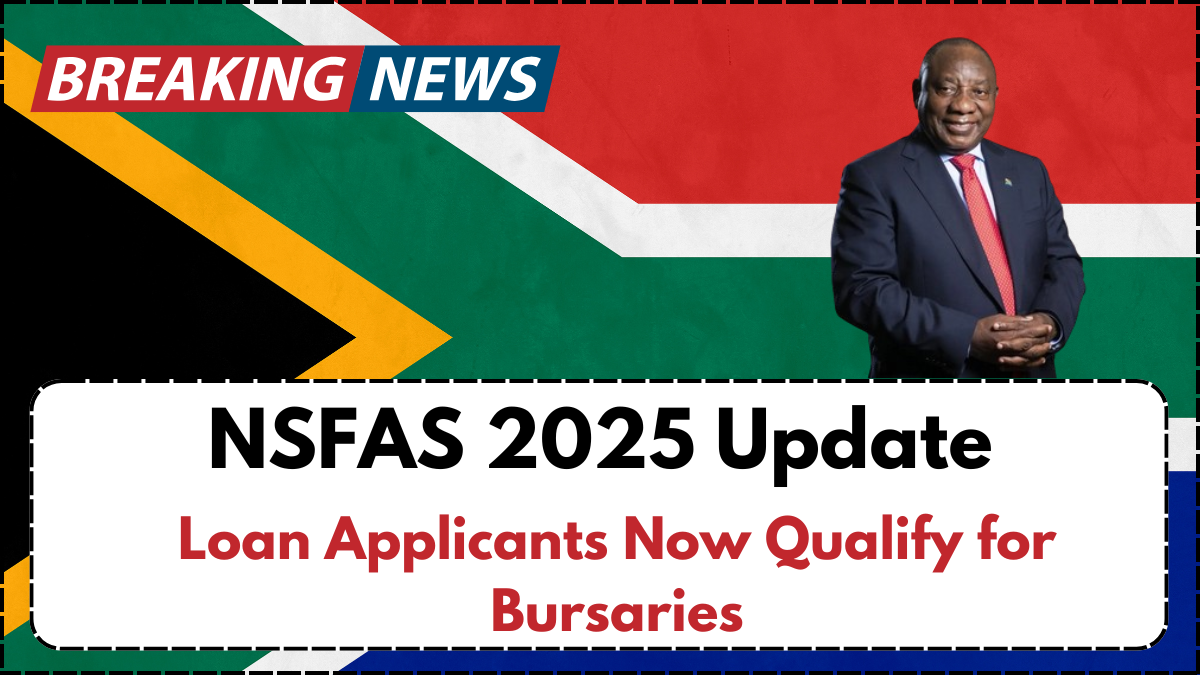In a groundbreaking decision this April, the National Student Financial Aid Scheme (NSFAS) has transitioned thousands of student loan applicants into bursary recipients. This move comes after an extensive review process aimed at reassessing eligibility based on household income and updated funding criteria.
This transformation significantly benefits students from low- and middle-income families, removing the burden of repayment and providing them with comprehensive financial support for their studies.

NSFAS 2025 Funding Decisions: Key Figures
NSFAS has published official statistics showing the number of students initially applying for loans who have now been approved for bursaries.
NSFAS 2025 Application Outcomes
| Application Status | Number of Applicants |
|---|---|
| Approved for Bursaries | 16,013 |
| Applications Under Review | 1,504 |
| Applications Rejected | 1,487 |
| Rejected Due to Income Exceeding R600,000 | 104 |
With over 16,000 students now receiving full bursaries, a large portion of those who originally sought loans have been granted non-repayable financial assistance instead.
NSFAS Income Requirements: Who Qualifies for a Bursary?
The eligibility for NSFAS funding depends primarily on household income. The two main financial aid categories are:
NSFAS Income Eligibility Criteria
| Funding Type | Annual Household Income Bracket |
| NSFAS Bursary | R350,000 or less |
| NSFAS Loan | R350,001 – R600,000 |
Students from households earning up to R350,000 annually qualify for a full bursary that covers tuition, accommodation, and additional expenses. Those whose family income falls between R350,001 and R600,000 may still qualify for an NSFAS loan, which requires repayment.
Comprehensive Financial Support Covered by NSFAS in 2025
Beyond tuition fees, NSFAS ensures students receive complete financial support to sustain their education. The funding includes:
- Tuition Fees: Fully covered at approved public universities and TVET colleges.
- Registration Costs: NSFAS directly pays institutions for registration.
- Accommodation Assistance: Support for both on-campus and off-campus housing.
- Living Allowances: Helps with daily expenses, including food and personal necessities.
- Learning Material Support: Provides funds for textbooks, stationery, and electronic learning devices.
With these provisions, students can focus entirely on their academic progress without financial constraints.
NSFAS Assistance for TVET College Students
TVET college students who applied before the final NSFAS deadline in January 2025 are currently being assessed. Final application decisions are expected to be released soon.
Eligible TVET students will receive the same financial benefits as university students, provided they meet the necessary academic and income requirements.
How to Check Your NSFAS Application Status in April 2025
Students who applied for NSFAS funding should frequently check their application status to stay informed. Follow these steps to monitor progress:
- Visit the NSFAS Website: Go to www.nsfas.org.za.
- Log in to Your MyNSFAS Account: Enter your ID number and password.
- Check Your Dashboard: See your application’s latest status.
- Enable Notifications: Sign up for SMS or email updates to receive alerts.
Applicants under review should ensure all required documents are uploaded promptly to prevent delays or rejection.
Conclusion
The NSFAS 2025 funding changes mark a significant milestone, converting thousands of student loan applications into bursary approvals. With over 16,000 students already benefiting, this initiative makes education more accessible by removing financial barriers.
Applicants still awaiting their results should stay updated via the NSFAS portal and ensure all necessary documents are submitted to secure their funding. This strategic shift strengthens financial aid accessibility and supports students in achieving their academic goals without the burden of loan repayment.
Frequently Asked Questions (FAQ)
1. What should I do if my NSFAS application is still under review?
If your application is being processed, check your online dashboard regularly and provide any outstanding documents as requested to avoid delays.
2. Can I appeal if my NSFAS application is denied?
Yes, if your application is rejected, you can submit an appeal through the NSFAS portal, along with any relevant supporting documents.
3. What does the NSFAS bursary cover?
The bursary covers tuition, registration, accommodation, living costs, and learning materials, ensuring comprehensive support for eligible students.
4. How can I determine whether I qualify for a bursary or a loan?
Students from households earning R350,000 or less qualify for bursaries, while those earning between R350,001 and R600,000 may be eligible for repayable loans.
5. When will TVET college applicants receive their NSFAS results?
Decisions on TVET college applications are expected to be announced soon. Applicants should check their NSFAS accounts for updates.
Click here to learn more
Pari is a passionate writer known for captivating stories that blend imagination and reality. Inspired by travel, history, and everyday moments, Pari crafts narratives that resonate deeply with readers.